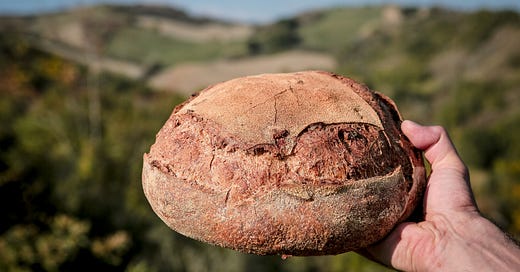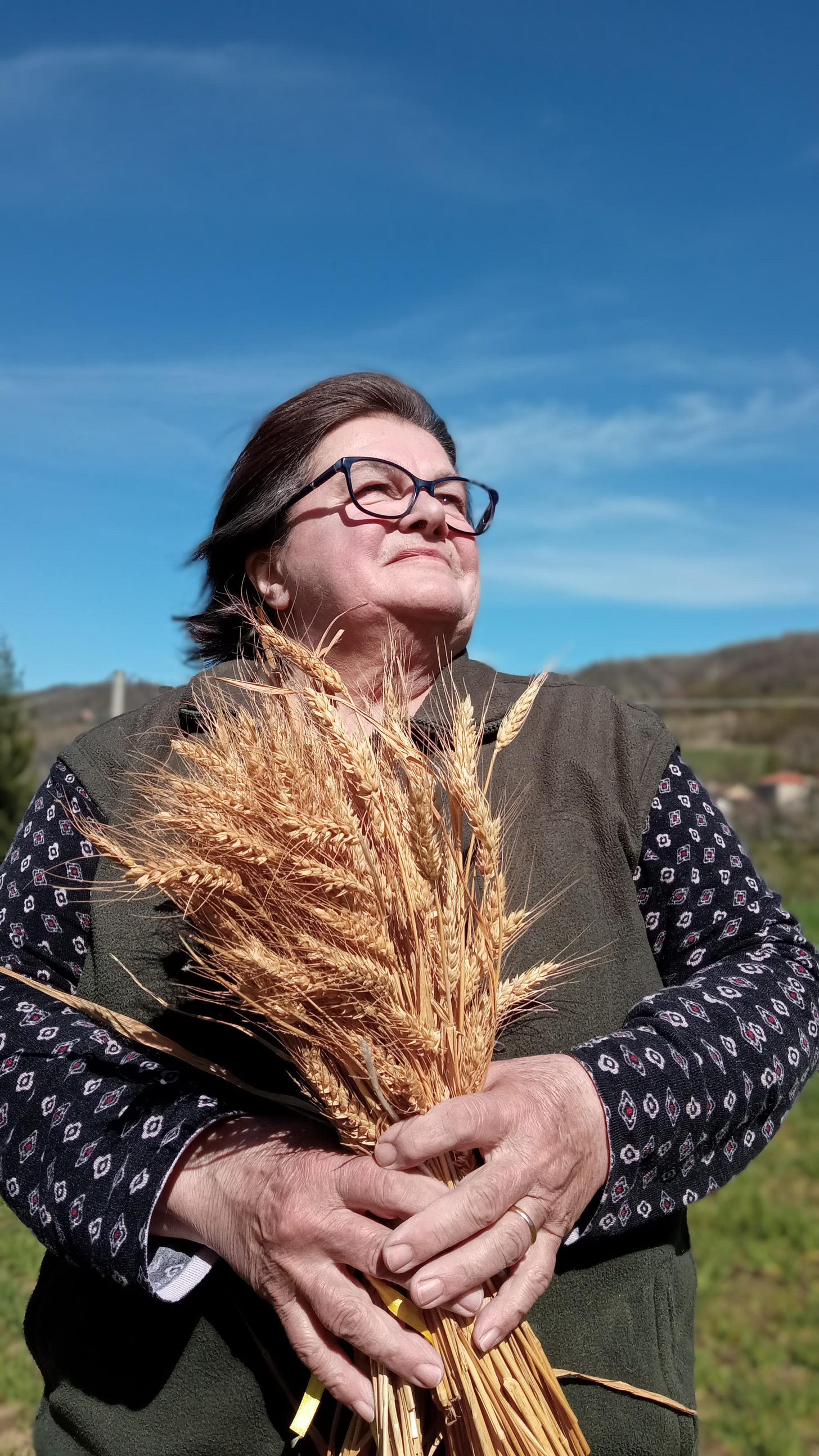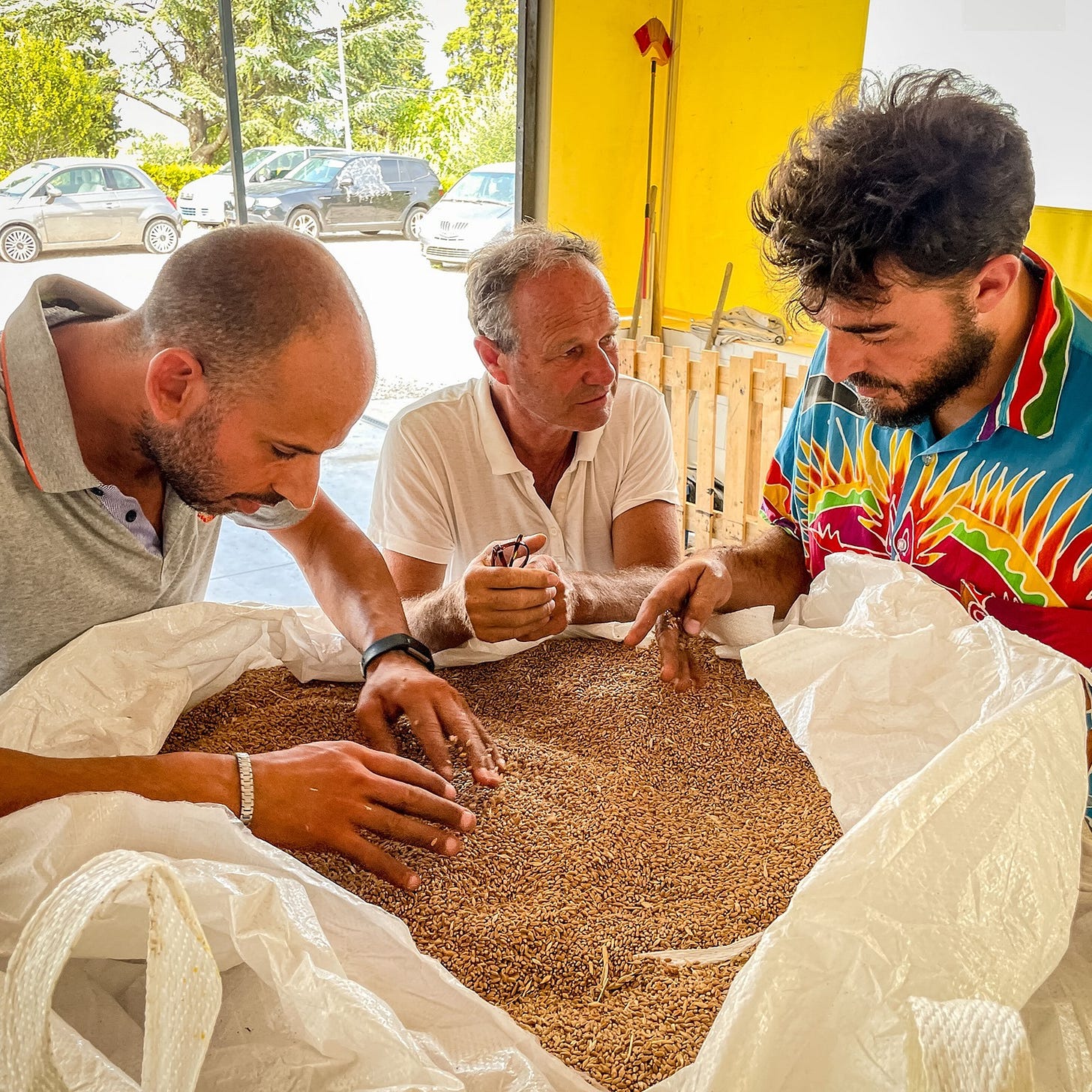Grain-y Conversations
Farmers talking grains, GMOs and community (plus an invitation to Italy!)
Hey there Interested Eaters!
It's been a minute since we last delved into the world of Comunità Grano Alto1 (also known as the Comunità). With their biannual festival celebrating bread and grains just around the corner, it seems like the ideal time to reconnect and ask some of the food world’s burning questions.
Do you daydream about spending two days knee-deep, investigating and learning about your favorite food? Well, we certainly do. It's been a while since we last wrote about this community, but it feels like the ideal moment, just before the excitement unfolds.
We surveyed a few community members – and despite their hectic spring schedules, they shared some thoughtful insights with us. Below, you’ll find their responses, translated by yours truly.2
What value does the community have for you? Why do you want to see the Comunità survive?
Lorenzo Cagnoli e Furner dl’Inferne, Owner & Baker, Pasta Madre Forneria Contadina
Values of sharing, mutual help, living on one’s territory, caring for one's fields, whether cultivated or wooded. […] Being proud of the work, laughing, sweating, celebrating it within the territory and community. With the passing of generations, we are regenerating the bond that unites us to peasant culture.
Teresa Michelini, Farmer, Az. Agr. Michelini Teresa, Farmer
The community is important as a nucleus of people who pursue a common goal and are committed to achieving it according to their abilities, skills and means.
Marco Lelli, Farmer, Azienda Agricola Marco Lelli
It certainly has an important value. The Comunità is a pathway for us, as producers, and for our products to gain recognition. […] Surely, the community also has a social value, unifying us and creating relationships between us. Therefore, in my opinion, besides having a social value, it also has an economic value.
Matteo Calzolari, Baker and Owner, Forno Calzolari; Co-Founder, Comunità Grano Alto
The community has taught us a new and open way of thinking about the future: valuing the work in the mountains and joining a network of other communities to change the values we give to things.
What would you say to someone who claims that bread from traditional grains is too expensive and unaffordable?
Marco: I would say to come and spend a day in the countryside to see how much effort it takes to grow in the mountains. Most of us are used to large-scale retail loans, which are loans that hardly even cover our costs. So if I were to sell to a large-scale retailer, it would cover around 60% of the costs I have to produce the same bag of flour. I would like someone to visit one day in the mountains with us to experience a day in our shoes and realize all of the work behind a jar, a cap, a label, or a loaf of bread. And then realize that the one you are paying less for, you should ask yourself why it costs less!
Teresa: Is the price of ancient wheat too high? It produces 30% less than modern wheat, is more susceptible to disease, and is more exposed to the phenomenon of “lodging” (because they are very tall). I think those are sufficient reasons for the higher cost.
Lorenzo: Do you know what it means to reintroduce an old variety into the field? Researching the seed, selecting it, knowing its history, choosing suitable soils and sowing it?
Imagine that this work brings together the skills of the agronomist (who is now in a position to do this research thanks to the natural selection carried out by farming families over the centuries for survival reasons) and the farmer (who stands on the land, knows his fields, the equipment, the climate and the wind and to choose where and when to sow the high grains). If they harvest well, a farmer will often harvest three or four times less seed than a modern dwarfed wheat. Do you know what it means to harvest and store the grain?
Do you know what it means to take the seed to the miller? To choose a good, knowledgeable miller, who does not alter the quality of the crop, but rather improves it – thanks to his scientific/artisanal knowledge, and without adding products other than the grain and its original structure?
The burden and honor of the artisan are to communicate the story and the work of all, as they often have direct contact with the 'final consumer'. I have always thought that the main value of bread is to feel like returning to one's native home, an inner landing place after a long journey. A place where you don't need a bed but just sacks of flour to rest, where there is no work but integration and shared goals, a place to grow and decrease in continuous waves, a place to play and experiment and finally relax. A place of peace and freedom. Bread is a communal product for the community. Its value is priceless. Its value lies in the awareness of each of us.
Matteo: It is the price of a fair wage for everyone involved in making that bread, and there are no hidden prices. It is only the price of field rotations and artisan labor. To ask what they are willing to pay, one must know each person who makes that bread and read thoroughly the labels of what they are purchasing.
What do you think about 'ancient grains'? How would you respond to accusations that they are just a 'marketing scam'?
Lorenzo: 'Ancient grains' is now an empty, fashionable term, compromised by marketing and various scams. There is also a difference between old varieties and ancient grains. Before talking about ancient grains, one must also investigate the genetics, historical and cultural passages and selections that have taken place over the years.
I like best to think of them as tall grains [i.e., grains of tradition and territory, grains not modified in laboratories but sown in the field over centuries], obviously including evolutionary populations, as grains of the future.
Marco: Last year, I sowed Ardito, an ancient grain variety. This year, for crop rotational reasons, I had no space for them, so I did not sow them. Honestly, I think that, concerning ancient grains, there is absolutely no culture, absolutely no training, absolutely no information. So when someone on television hears about ancient grains, I think 90% of the people don't even know what they are talking about. I think it's up to the people who use them, who produce them and who, most importantly (and unfortunately) market them to make them understand the difference.
Matteo: These grains are tall; from this perspective, you can see we are dealing with agriculture and people who believe in what they do. There is a world of rediscovery behind the grain.
Teresa: As for the cultivation of ancient grains… everything can be a scam. But let's consider what is real, like the reality of our Comunità. I think that is already a satisfactory answer.
How do you feel about the recent deregulation of the 'new' genetically modified organisms (GMOs)?
Lorenzo: It will be increasingly difficult to stop the speculations of our capitalist system that puts profit first at the expense of biodiversity and small, widespread, decentralized good farming practices.
This is another reason why confrontation between different entities, individual or communities, is increasingly necessary to gain strength. Sharpen the scythes and demonstrate that it is possible to do agricultural or artisan business without compromising with agro-industry.
Matteo: It is the same old way of understanding agriculture: it has to be produced by necessity with the same old chemicals and in the same old, depleted lowland soils. Instead, I believe that we should invest in and acknowledge mountain agriculture that preserves the land and cares for the environment and in resources for technological advancement and new machinery.
Marco: It is clear that GMOs, like so many other things, are in the hands of multinational corporations and that money always wins, unfortunately. These corporations have the seed fertilizers in their hands, and they are not many, they are not 50,000… they are around 4. So, this kind of world supports these people who often have motivations of several zeros on their bottom line and convinces a country to deregulate it, to add a rule in or to take it out.
In my opinion, they are really two completely different concepts that apply to two completely different worlds. So it's not that I'm against it, it depends on the context. And above all, it just needs to be clarified. If in the supermarket, the bread with the GMO wheat was labeled “contains GMOs” and on the bread from the smaller baker, “does not contain GMOs”, you would give the buyer the choice of what to buy. Obviously, if you write nothing here and write nothing there, you don't educate people and then they don't know what they are buying.
If there is something you would like people to know about your work, what would it be?
Matteo: That I work by cultivating relationships with people and land.
Lorenzo: I would like people to know that my work is very beautiful and stimulating. If it grabs you, you can't do without it. It is more of a drug than nicotine, more psychedelic than acid. For this reason, it cannot be called work, but life lived intensely.
Marco: There are two things that I would like people to know… One, we call ourselves the Tall Grains Community (Comunità Grano Alto), but I grow almost everything other than that. So, I'd like to let people know that, inside the community, we don't only grow grains, but we also grow other crops like corn, tomatoes, and onions. Two, we recover old seed varieties, whether wheat or other cultivars. Beyond using and believing in organic practices, we aim to be also environmentally friendly. Organic doesn't only mean that I don't use pesticides or herbicides, but I think it also means that maybe you are respectful of the ecosystem in which you live.
Teresa: I would like people to know that despite fatigue, constant commitment, and weather uncertainty, what we mountain farmers do is not only a job but also a territorial presidium [custodian of the land].
After delving into the perspectives of these Comunità members, it is clear that the intricate web of relationships, both above and below ground, propels our community forward. This labor-intensive, often under-appreciated work almost requires building robust relationships in order to survive and flourish. This seems to be the value of community, as it gives space for this complex conversation. The conversation does not end here.
For those of you in Italy (or for anyone looking for a reason to travel), consider joining us for this upcoming festival on June 1st and 2nd for two deeply enriching days, as we break bread and “get grainular.” Our ultimate goal is to bring clarity to an opaque system.
As Lorenzo highlights, the journey from seed to flour to bread embodies a collaborative process – each participant in the Comunità is active, knowledgeable and collaborative. Just as this process is marked by transformation, so too is the Comunità evolving toward building something greater: drawing from the wisdom of the past, navigating the way forward, and leveraging our experiences to shape a more sustainable grain system.
A huge thank you to Lorenzo, Teresa, Marco, and Matteo for their insights. Stay tuned for the next post on the Comunità… and in the meantime, check out the event website and program!
P.S. Follow Food People on Instagram, Facebook, and LinkedIn 💚
Comunità Grano Alto is a network of breeders, farmers, millers, bakers, agronomists, geneticists, researchers, advocates, and enthusiasts in Emilia Romagna, Italy aiming to (re)build relationships along the regional grain supply chain. For more information, check out our introduction article or their website.
Full disclosure: I (Christina) am part of the Comunità, so forgive the hint of self-promotion. But it's also a chance for you to hear some insights directly from the members themselves.









Dope food! Have you tried making gnudi? https://www.instagram.com/reel/C9kXmEqO3Kd/?igsh=c2NkaHR4cXBrZHI2